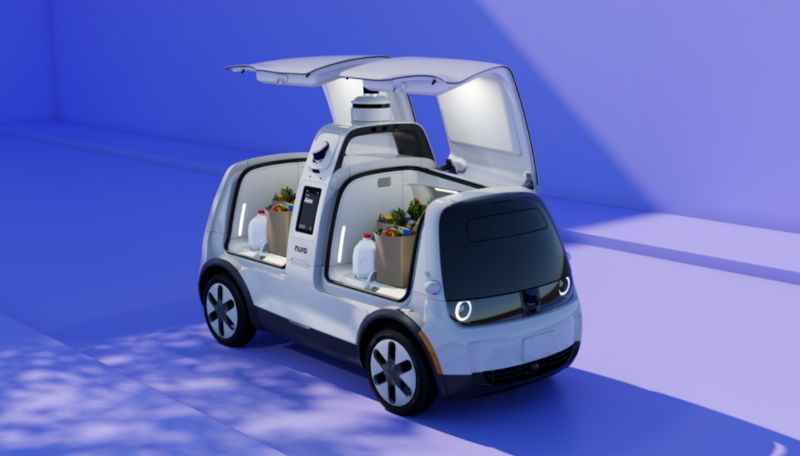 EMERGING TECH
EMERGING TECH
 EMERGING TECH
EMERGING TECH
 EMERGING TECH
EMERGING TECH
Autonomous delivery startup Nuro Inc., which reportedly received a $8.6 billion valuation last year, today introduced a new self-driving vehicle that will be used to ferry groceries and other goods to consumers.
The vehicle (pictured) can transport about 24 bags of groceries at a maximum speed of 45 miles per hour. Merchandise is stored in compartments that each have 27 square feet of capacity. When needed, the compartments can be equipped with modular devices that are capable of setting the temperature to between 22 and 116 degrees Fahrenheit depending on what merchandise is being transported.
The flagship improvement in Nuro’s latest delivery vehicle is a set of features designed to improve pedestrian safety. Nuro has added an external pedestrian airbag to reduce the risks posed by potential collisions. While at it, Nuro’s engineers reduced the width of the vehicle by 20%, which the startup said “gives bicyclists and pedestrians more room to maneuver alongside the bot.”
“Our next-generation vehicle is designed to safely operate in the same environment as all motor vehicles,” Nuro added in an announcement today. “That allows us to serve a wide variety of geographies that experience various weather conditions throughout the year.”
Nuro plans to produce its new autonomous delivery vehicle at a Nevada manufacturing facility that is currently under construction. In the long term, the startup is aiming to deploy tens of thousands of delivery vehicles and provide last-mile delivery services for millions of consumers.
The startup received its reported $8.6 billion valuation in November after raising a $600 million funding round from Google LLC, SoftBank Group Corp. and other investors. Nuro is using the capital not only to produce more vehicles but also to build a test track adjacent to its planned Nevada manufacturing facility. The test track will be used by the startup’s engineers to ensure the vehicles work as expected in a variety of driving situations.
One way Nuro plans to commercialize its technology is by partnering with retailers to provide autonomous delivery services to their customers. Last month, the startup said that it’s teaming up with 7-Eleven Inc. to launch California’s first commercial autonomous delivery service. The companies initially plan to use a fleet of Toyota Prius vehicles equipped with autonomous driving software, which will in the future be replaced by Nuro’s custom-designed vehicles.
Nuro is also establishing partnerships in the logistics market. Last June, the startup announced that FedEx Corp. had “made a long-term commitment to use Nuro’s autonomous bots for last-mile delivery at large scale.” The robots will complement FedEx’s existing fleet of more than 200,000 vehicles, which deliver about 18 million packages every day.
Nuro is one of several startups competing in the emerging autonomous delivery market. Another startup focused on this area, Starship Technologies Inc., raised $17 million in funding early last year to grow its fleet of sidewalk delivery robots.
THANK YOU